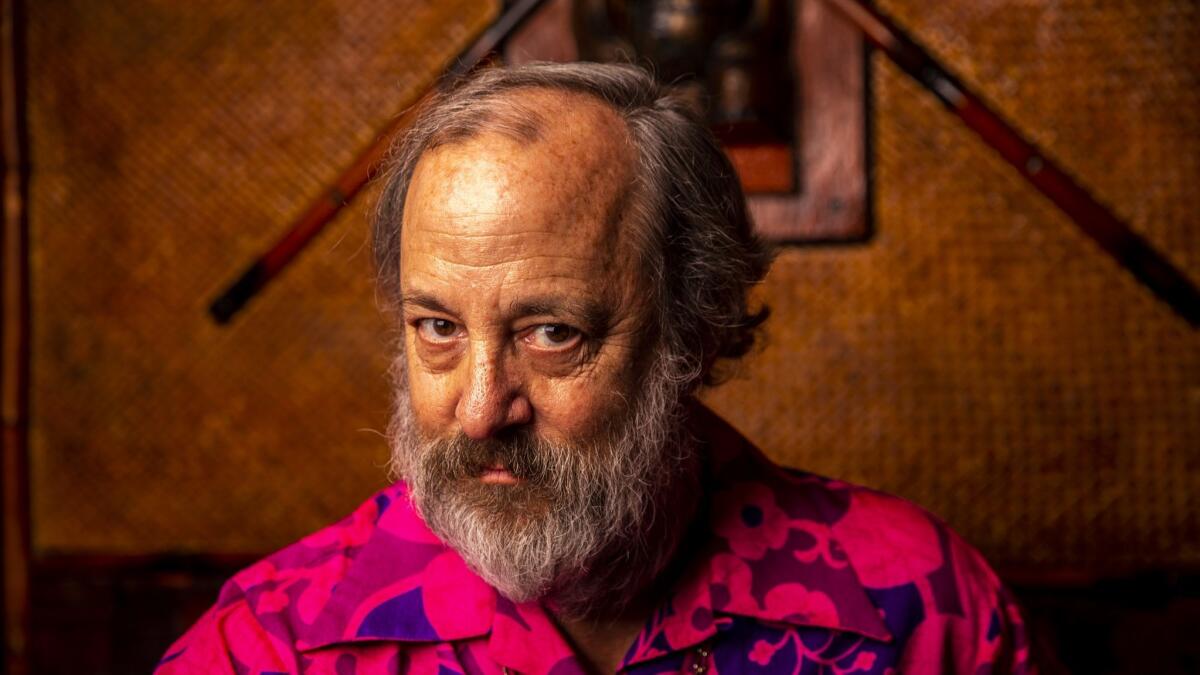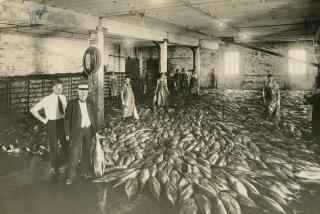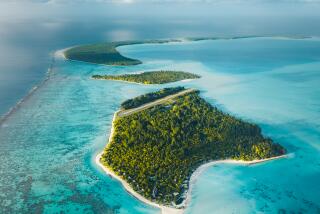A new collection gathers the exotic sounds of Paul Page, a seafaring would-be pirate in love with Polynesia
Although born in Indiana and quite obviously Caucasian, the handsome, would-be seafaring musician who recorded as Paul Page made his name writing and singing sweet, slightly surreal songs about the Pacific Rim lifestyle.
Throughout his life, the artist, who started his career in the 1930s, was a bandleader on NBC Radio, moonlighted as a male model and spent more than three decades entertaining diners and dancers at dozens of Polynesian-themed Southern California bars and restaurants, along the way recording a series of albums that romanticized island life.
A new collection called “Pacific Paradise: Paul Page and his Paradise Music” gathers some of the obscure artist’s most beguiling songs — some named after long-gone area tiki bars — placing into the tropical sunlight a dusty relic from Los Angeles music’s past. It’s a land that exists, as a choir of women (mermaids?) sing to introduce the collection’s titular opening song, only “beyond the blue horizon, across the deep blue sea.”
The release, issued by Swedish label Subliminal Sounds, couldn’t come at a more opportune time: A new wave of tiki-themed spaces around the region is revisiting this uniquely California culture and lifestyle. In downtown L.A., Lost Distillery makes rum in a jungle-themed, tiki-accented space in the Arts District that features a flume carrying an eight-seat canoe. Last year, Lono, a decked-out Hollywood tiki club, opened. In Little Tokyo, a bar called the Mermaid will arrive in the fall.
On Aug 8, the annual Tiki Oasis, a five-day festival devoted to “lovers of island lifestyle and purveyors of Polynesian pop,” commences at Crowne Plaza in San Diego. In addition to a roster that includes artists El Vez, King Kukulele, Vicky Tafoya & the Big Beat and Martini Kings, the festivities will present a symposium on Page with panelists Domenic Priore, a crate-digging, archive-scouring writer and researcher, and Subliminal Sounds’ Stefan Kéry.
It’s arguably the most action on the tiki front since a 1990s revival of easy-listening music, spawned in part by the book “Incredibly Strange Music,” that celebrated the “exotica” sounds of L.A.-based artists including Martin Denny, Les Baxter and Juan Garcia Esquivel.

Page’s resurrection wouldn’t have occurred without the work of Priore, who first stumbled across a Page album called “Pieces of Eight” in the mid-’90s during a going-out-of-business sale at Honolulu record shop Froggie’s. At the time, pop culture was starting to revisit oft-cheesy lounge sounds, dubbed “Space Age bachelor pad music” in a successful series of collections, and the writer helped to lead the renewed interest.
Priore, whose most recent book, “Riot on Sunset Strip,” documents the history of the famed West Hollywood district, writes in the release’s liner notes that the album “sat in the midst of their Hawaiian records, standing out like a sore thumb, this Polynesian Pirate guy, looking like he came right out of a Gary Cooper movie.” Priore recalls thinking, “This is white. What is he doing in here?”
The collector left the store with stacks of records, he said. “But that was the one album where I was like, ‘I can’t wait to get home.’ The back cover had all these drawings of tikis and ports-of-call, but it was in his own handwriting. It looked like a message in a bottle.”
Page’s missive praised the pleasures of a culture that was utterly alien to him, serving as a tour guide on semi-narrated journeys in songs with titles such as “It’s All Wicky Wacky in Hawaii,” “The Big Luau in the Sky,” “Leaves From My Grass House” and other lyrically anachronistic ditties.
His affection was part of a trend, nudged into the mainstream via the 1915 Panama-Pacific International Exposition in San Francisco. The expo was a celebration of the Panama Canal opening, and the worldwide attention fueled a Hawaiian music fad in the 1920s. Decades later, GIs returning from the Pacific after World War II brought with them an affection for an idealized take on the region’s music — and cocktails.
Page lead a Hawaiian band while hosting a Chicago-based NBC Radio show, but after relocating to NBC studios at Sunset Boulevard and Vine Street, he expanded to a full big band including, Priore says, “dancing girls and a vocal trio that included [pop singer] Kay Starr and her sisters.” They performed at a Hollywood club called the Seven Seas, which was across the street from Grauman’s Chinese Theatre.
A restaurant boom further propelled Page and band’s bookings, and songs on “Pacific Paradise” prove the point: “Pieces of Eight,” “Castaway,” “Ports o’ Call” and “The Reef” are named after restaurants where he performed — and sold — his music.
Writes Kery in cover notes, describing two sub-genres of Pacific-inspired music of the period, “Hapa haole and exotica music mapped a white man’s dreamscape of romance in a tropical paradise, and its language formed a lexicon of exotic cliches that reiterated an idyllic image.”
Kery compares the movement to “a mantra designed to keep an ephemeral energy from dissipating.”
The line between celebration and appropriation is blurry across “Pacific Paradise,” but Page didn’t attempt to pass as a native islander. Rather, like generations of Americans who lived through WWII and then welcomed Hawaii as the 50th state, his “white man’s dreamscape” seemed sincere, even if decades later some of it comes off as naive and more than a little patronizing.
“My Fiji Island Queen,” for example, imagines a relaxed life spent with the aforementioned partner who “may appear quite wild” but “doesn’t cost a cent for her upkeep, for there’s nothing that she needs.” The truly strange recording “Matey” is an adaption of a story from Homer’s “The Odyssey” about the lure of desirous creatures. “Mele of Forgotten Men” tells of a whole society that, after relocating to another island, “made some new gods, kept some old ones, named the island, named the mountains” and “wove their curious tales...”
“It was almost like an act that he created,” Priore says, adding that his research revealed “that he’d been concocting this from Day 1. He’s from the Midwest, but his dream is to be like a roving, seafaring, Pacific Ocean version of what in England would be a sea-shanty kind of guy.”
Backed by noted Hawaiian steel guitar player Bernie “Kaai” Lewis, who was a session musician on a number of Elvis Presley records, Page’s recordings resonate with musical authenticity, even if his gentlemanly song-talking is as Midwestern as they come.
The combination adds a tension, one furthered by time’s way of rendering obsolete even the most romantic notions. “When Sam Goes to Samoa” retells a story of a young immigrant in love with America who, as a way of fulfilling his destiny, “sailed for the States one day / And he made the grade on the hula hit parade / With his songs of the islands far away.”
For tips, records, snapshots and stories on Los Angeles music culture, follow Randall Roberts on Twitter and Instagram: @liledit. Email: randall.roberts@latimes.com.
More to Read
The biggest entertainment stories
Get our big stories about Hollywood, film, television, music, arts, culture and more right in your inbox as soon as they publish.
You may occasionally receive promotional content from the Los Angeles Times.







